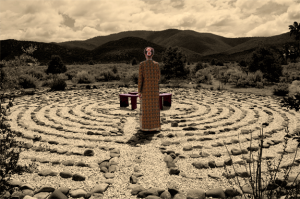 We had our Sunday Introduction to Meditation Class at Yoga Bliss yesterday. We’ve been working with the four foundations of mindfulness: awareness of the body, feeling tone, thoughts, emotions and then all phenomena. We drew our practice inspiration from B. Alan Wallace’s Minding Closely: The Four Applications of Mindfulness.
We had our Sunday Introduction to Meditation Class at Yoga Bliss yesterday. We’ve been working with the four foundations of mindfulness: awareness of the body, feeling tone, thoughts, emotions and then all phenomena. We drew our practice inspiration from B. Alan Wallace’s Minding Closely: The Four Applications of Mindfulness.
We included two practice periods and a walking meditation.
We continued to practice with the second application: mindfulness of feelings. We explored the way sensory experience evokes feeling and feeling often triggers an impulse to avoid or cling to feeling. We systematically scanned areas of the body to enhance and focus perception. I find it fascinating to observe the way my mind responds by recalling associations from past experience, imagining or rerunning scenarios from current life or planning the future. These “mind moves” happen lightening fast. They also seem to have a life of their own once they get going.
All my thoughts seem to have a “somatic signature.” I feel them as sensation somewhere in the body. It’s hard to fully appreciate how sensitive we can be – especially when we’re so busy covering over this same sensitivity with distraction and stimulation. Not surprisingly, busyness has undermined my intention to live with respect for the sensitivities of others. I’ve faltered painfully in relationships with family and friends – usually due to lack of consideration or understanding. That’s one of the big reasons why I sit.
We talked about the stress in our lives and the “tyranny of doing.” The somatic expressions of our bodies often emit distress signals. Sadly they often manifest in fatigue, illness, lack of sleep, conditions that make us accident prone and negligent of others. I believe as we become more intimate with the workings of our own body/minds, the way we avoid, cling or impulsively react to experience, we have a deeper appreciation for the state of our shared human condition. We create an opening for empathy and compassion. We have an opportunity to see ourselves more clearly and unwind unquestioned conditioning.
In post meditation reflection, we can examine this unwinding as it reveals the causes and conditions that give rise to our behaviors. We can further contemplate the future affects of our present day thoughts, words and deeds. In the companionship of others we can share our struggles to lead “good” lives. By that I mean, lives in which we can flourish together with our fellows and shared environment. This reverence for life is at the heart of yoga and contemplative practice.
I deeply appreciate the people who come together with a shared intention of affirming this form of well being. As I mentioned in class, some of us do this to better engage with the world. Meditation instructor and author, Michael Stone, encourages students to find “battles that are small enough to win and big enough to matter.” This is a good subject for contemplation and, of course, action! Together we are supporting the work of Doctors Without Borders through our weekly class donations. In this way our sitting practice is working inside our hearts and minds and extended beyond ourselves through the good work of brave humanitarians. Meanwhile I ponder:
What battles are small enough to win & big enough to matter?
